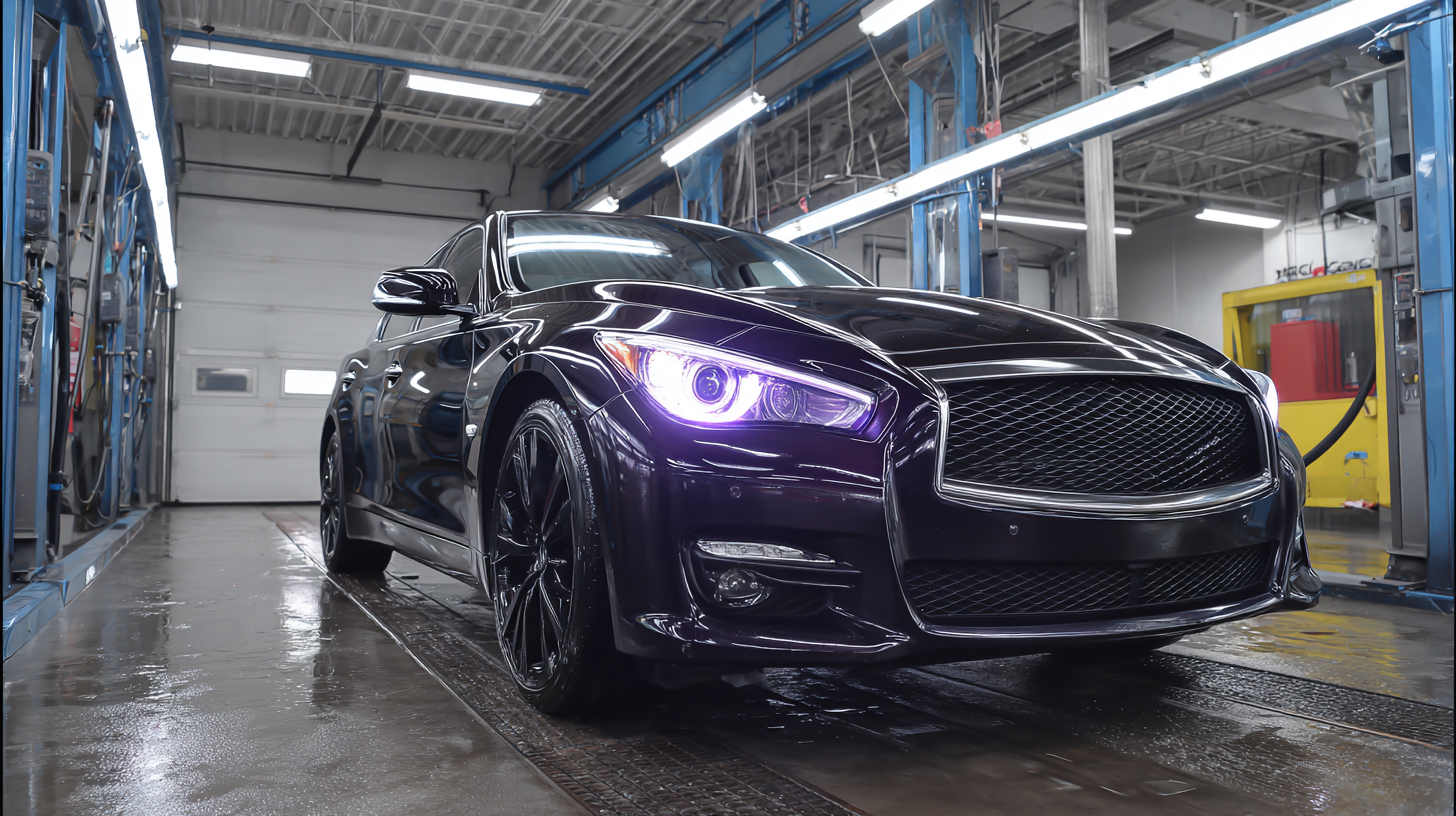Challenges Faced by Buyers When Sourcing Best Self Car Wash Equipment
In the fast-evolving automotive care industry, buyers face significant challenges when sourcing the best
self car wash equipment. According to a report from IBISWorld, the car wash industry
has seen consistent growth, projected to reach
$12 billion in annual revenue by 2025, driven by the
increasing demand for automated washing solutions. However, selecting the right equipment can be daunting due
to the plethora of options available, varying quality standards, and differing technological advancements.
 Furthermore, the complexity of the equipment setup and the ongoing maintenance requirements pose additional hurdles for buyers.
As businesses strive to enhance customer satisfaction while managing operational costs, understanding the various
benefits and limitations of different self car wash equipment becomes crucial. This blog will explore these challenges
in detail, offering insights to buyers on how to navigate this competitive landscape effectively.
Furthermore, the complexity of the equipment setup and the ongoing maintenance requirements pose additional hurdles for buyers.
As businesses strive to enhance customer satisfaction while managing operational costs, understanding the various
benefits and limitations of different self car wash equipment becomes crucial. This blog will explore these challenges
in detail, offering insights to buyers on how to navigate this competitive landscape effectively.
Challenges in Identifying Quality Car Wash Equipment in a Saturated Market
In today's saturated market for self car wash equipment, identifying quality products can pose significant challenges for buyers. According to a recent industry report by IBISWorld, the car wash equipment manufacturing industry is projected to reach $1.5 billion in revenue by 2025, reflecting a growing demand. However, this increase also brings about a flood of new suppliers, many of whom may not adhere to the highest standards of quality. Buyers must navigate through a plethora of options that often vary widely in performance and durability.
One crucial challenge lies in the lack of standardized quality metrics across the industry. While some manufacturers provide comprehensive warranties and certifications, others do not, making it difficult for buyers to assess true equipment reliability. Research indicates that nearly 60% of operators report dissatisfaction with their equipment within the first two years of use, primarily due to poor performance and breakdowns. To avoid these pitfalls, buyers should seek verified customer reviews and consider third-party evaluations, ensuring they invest in equipment that combines efficiency with longevity.

Understanding the Cost-Benefit Analysis of Self Car Wash Systems for Buyers
When it comes to choosing the best self car wash equipment, buyers often find themselves grappling with a complex cost-benefit analysis. Understanding the financial implications of investing in such systems is crucial, as it requires balancing initial capital outlay against potential long-term profits. Many buyers overlook ongoing expenses such as maintenance, water usage, and chemicals, which can add up over time. To make an informed decision, it’s essential for buyers to thoroughly evaluate not only the purchase price but also the projected operational costs and expected revenue generation.
Moreover, the effectiveness of self car wash systems can greatly impact customer satisfaction and retention. Buyers should consider the technology and features offered by different systems, such as efficiency, reliability, and ease of use. A system that reduces wash times and conserves water can lead to higher customer throughput and satisfaction, translating to greater profitability. By weighing these factors carefully, buyers can better understand the true value of their investment, ensuring that they choose equipment that aligns with their operational goals and financial anticipations.
Challenges Faced by Buyers When Sourcing Self Car Wash Equipment
Impact of Technological Advancements on the Performance and Longevity of Car Wash Equipment
The evolution of technology has dramatically transformed the car wash industry, leading to significant improvements in the performance and longevity of self-car wash equipment. Advanced features, such as automated pressure control systems and eco-friendly detergent dispensers, have enhanced the efficiency of car wash machines. These innovations allow for a thorough clean while minimizing water usage and environmental impact, which appeals to both eco-conscious consumers and business owners looking to reduce operational costs.

Moreover, the durability of modern car wash equipment has greatly improved due to advancements in materials and engineering. For instance, components made from rust-resistant alloys and high-performance plastics withstand the rigors of frequent use better than their predecessors. This enhancement not only reduces maintenance costs but also increases the lifespan of the equipment, ensuring that buyers get a better return on their investment. As technology continues to evolve, staying informed about the latest advancements will empower buyers to make the best choices when investing in self car wash equipment.
Navigating Regulatory Compliance and Environmental Standards in Car Wash Operations
When sourcing the best self car wash equipment, buyers must navigate a complex landscape of regulatory compliance and environmental standards, which are crucial to operating legally and sustainably. For instance, recent discussions around licensing hand car washes emphasize the need to prevent exploitation of workers and mitigate water pollution. The Environmental Audit Committee underscored the importance of requiring licenses for these operations, linking regulatory compliance directly with ethical labor practices and environmental stewardship.
Moreover, the automotive sector is witnessing a significant shift toward sustainability, as highlighted in the 2024 update of the Environmental Statement from the European Central Bank. This document showcases the industry's commitment to reducing its environmental footprint, aligning with the EU's ambitious sustainability targets. With manufacturing industries on the brink of transitioning to net-zero and circular value chains, sourcing car wash equipment that adheres to these environmental standards is now more critical than ever. Buyers face the challenge of ensuring that their chosen equipment not only complies with existing regulations but also contributes positively to long-term sustainability efforts, thus driving corporate growth and innovation in a rapidly evolving market.
Strategies for Evaluating Supplier Credibility and Equipment Reliability for Buyers
When sourcing self car wash equipment, the credibility of suppliers and the reliability of the equipment are critical considerations for buyers. A recent industry report by IBISWorld indicates that the car wash equipment manufacturing sector has seen a steady growth rate of approximately 3.5% annually over the past five years. This growth underscores the importance of evaluating suppliers who can keep pace with industry advancements, particularly for self-service and automated systems that enhance usability and efficiency.
To evaluate supplier credibility, buyers should consider factors such as industry certifications, customer reviews, and the supplier’s track record. According to a study by the Specialty Equipment Market Association (SEMA), approximately 60% of consumers prefer equipment backed by reputable brands, which often correlate with high-quality ratings and customer satisfaction scores. Additionally, assessments of equipment reliability should include warranty offerings and maintenance support. A reliable supplier should provide comprehensive service agreements and transparent communication regarding equipment performance, as highlighted by a recent survey from the International Carwash Association, which found that 70% of operators prioritize long-term support and warranty as key factors in their purchasing decisions.
Challenges Faced by Buyers When Sourcing Best Self Car Wash Equipment
| Criteria | Description | Importance Level (1-5) | Recommended Strategy |
|---|---|---|---|
| Supplier Credibility | Assessing the reputation and reliability of suppliers to avoid fraud. | 5 | Check online reviews and ratings, ask for references. |
| Equipment Reliability | Ensuring equipment meets performance expectations and durability standards. | 4 | Request product demos and performance tests. |
| Warranty & Support | Understanding warranty terms and availability of customer support services. | 4 | Review warranty details and inquire about customer service availability. |
| Cost vs. Value | Determining if the equipment's price aligns with its quality and benefits. | 5 | Conduct cost-benefit analysis comparing similar products. |
| Regulatory Compliance | Ensuring equipment meets local environmental and safety regulations. | 3 | Research applicable regulations and verify compliance certifications. |